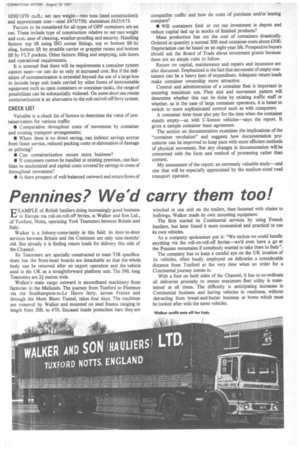Pennines? We'd carry them too!
Page 87

If you've noticed an error in this article please click here to report it so we can fix it.
EXAMPLE of British hauliers doing increasingly good business in Europe via roll-on-roll-off ferries, is Walker and Son Ltd., of Tuxford, Notts, operating York Teamsters between Britain and Italy.
Walker is a Johnny-come-lately in this field: its door-to-door services between Britain and the Continent are only nine months' old. But already it is finding return loads for delivery this side of the Channel.
Its Teamsters are specially constructed to meet TIR specifications but the front-head boards are detachable so that the whole body can be removed after an export operation and the vehicle used in the UK as a straightforward platform unit. The 39ft. long Teamsters are 24metres wide.
Walker's main cargo outward is secondhand machinery from factories in the Midlands. The journey from Tuxford to Florence via the Southampton-to-Le Havre ferry, across France and through the Mont Blanc Tunnel, takes four days. The machines are removed by Walker and mounted on steel frames ranging in length from 30ft. to 47ft. Encased inside protection bars they are winched in one unit on the trailers, then fastened with chains to bullrings. Walker made its own mounting equipment.
The firm started its Continental services by using French hauliers, but later found it more economial and practical to use its own vehicles.
As a company spokesman put it: "We reckon we could handle anything via the roll-on-roll-off ferries—we'd even have a go at the Pennine mountains if somebody wanted to take them to Italy".
The company has to keep a careful eye on the UK location of its vehicles, often busily employed on deliveries a considerable distance from Tuxford at the very time when an order for a Continental journey comes in.
With a foot on both sides of the Channel, it has to co-ordinate all deliveries precisely to ensure maximum fleet utility is maintained at all times. The difficulty is anticipating increases in Continental business and having vehicles in readiness, without detracting from bread-and-butter business at home which must be looked after with the same vehicles.




































































































































